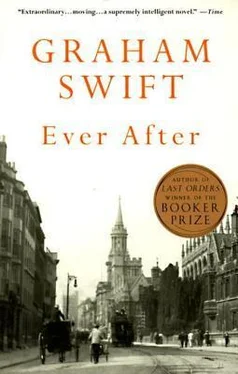Did he compromise his own faith sufficient to beg another man to play false with his? Or did he, indeed (Matthew failing to recite his creed), draw himself up — in his bee-keeper’s hat — to his full anathematical height and thunder: “Then never henceforth, etc., etc.…”?
The June afternoon still blooms. The bees still go about their summery business. The Rector stands alone among his little congregation of hives. Beyond the garden is the green flurry of the beech copse. Beyond that, the hedged languor of fields; warm, unavailing hills.
And if we do not have souls, why should we have these — feelings? These moments that rack and enrapture us and take us by storm. Why should things matter ?
He stares, in his quixotic outfit, at the little gate, set in the hedge, leading to the churchyard, through which Matthew has departed. He has shouted, twice: “Matthew!” For a moment, the sweetness of the afternoon turns to sheer nightmare around him. He sees himself in some medieval vision full of demons and terror. He is before the walls of some beleaguered city in which the pious cower for safety and he, their champion, is beating back, with the intrepid zeal which once he hoped to bring to the darkest corners of the earth, the ravening beast, Darwin. Then the vision melts into the mocking familiarity of Burlford church and its quiet churchyard, its trusting retinue of gravestones, and the immemorial murmur of bees.
At genus immortale manet, multosque per annos Stat fortuna domus …
Poetry! Fiction!
How long does he stand there? The Rector’s wife watches him. She knows that something extraordinary has happened. She has seen Matthew leave abruptly, not by the way he came but by the garden gate, and has watched the Rector watch him walk — retreat (so she pictures it) — across the churchyard and so out by the lych-gate to the street.
Well, and about time too. A few sharp words. For his own good. She feels a moment’s bristling solidarity with her husband, a moment’s pang for a stronger man she once knew.
But the Rector does not move. He stands there stock-still. At last he turns and walks slowly towards the house. He has quite forgotten to replace the roof on the second hive and quite omitted to inspect the remaining hives. And, as the Rector’s wife well knows, if you do not attend to the combs when the bees are in full production, then you will have trouble, you will have swarms. Not to mention the need to extract the honey — the golden honey which, for years now, it has been her proud custom, with a little sweet glance to her husband, to press upon guests for tea at the Rectory: “Now, you are not to go without tasting some of Gilbert’s celebrated honey.…”
The Rector walks towards the house, though not to speak to his wife. There is a French window in his study which opens directly on to the garden, and he makes straight for it. He does not remove his bizarre accoutrements — the gauntlets and hat. It seems that whatever it is that has happened out there has made him more than usually forgetful. Then the Rector’s wife sees that the wide-brimmed hat with its attached gauze curtain is still performing a useful function — the same function that her veiled black bonnet, and Elizabeth’s too, performed at little Felix’s funeral. Her husband is shaking with tears.
Qui quaerit, invenit . I wonder.
I received a letter from a Major Pilkington, whose exact function and status remain far from clear to me, but who appears to be the final clearing-house for any awkward but unignorable inquiry from the general public. I have tried to picture Major Pilkington, this man who (in a manner and language so different from Sam’s) has been the bearer of such significant if belated news. The name suggests some buffer of the old school. I see him therefore as a grey-moustached, reddish-cheeked, chubby-jowled figure, long since past his military zenith and thus edged into this dead-end, dead-letter job, which a sort of tendency to fat in his character enables him to perform with the appropriate cushioning tact. He looks (I imagine) more like a headmaster of the patient, understanding sort, or an inured but genial family doctor, than a major. “Now, what seems to be the trouble …?”
Then the image fades into that of some crisp, sharp-faced, still youngish high-flier. This, after all, is a responsible, if unspectacular, position: access to records, the handling of “sensitive” matters. And if it is a job in which our zealous career-maker has no wish to linger, then the best way to be shot of it and be picked for better and greater things is to carry it out with conspicuous diligence and the minimum of bureaucratic dither.
Dear Mr Unwin,
Your letter of 19th May has been passed on to me through various departments and it has been necessary to trace the relevant records. I apologise for the delay in this reply.
The records relating to your father’s death on 8th April 1946, and to his career from March 1945 until his death, are governed by the strictures regarding classified information. I am therefore not at liberty to enter into details. However, in view of the personal aspect of your inquiry and of the fact that, subsequent to your mother’s death, you yourself have received new information on the matter, I am authorized to make the observations below, while trusting in your absolute discretion.
Immediately following your father’s death, an internal inquiry was conducted into its circumstances. Your father was cleared of all suspicion of pressure brought to bear on him relating to a breach or endangering of security, and I must emphasise that his professional record remains that of an honourable man. However, it emerged from the evidence of colleagues and superiors that your father may have harboured, since the final months of the war, a growing aversion, on conscientious grounds, to the nature of his special duties, which, conflicting intolerably with his considerable dedication and ambition, may ultimately have contributed to his suicide.
The records show that your mother was interviewed during the inquiry and, beyond recognising that they involved secrecy, appeared to have had no knowledge of the sensitive aspects of your father’s duties. Indeed, she adduced the “personal reasons” for your father’s suicide, which I assume are those referred to in your letter and which I will not, therefore, comment upon further.
It was deemed necessary for the purpose of the inquiry to inform your mother, in the strictest confidence and in the barest terms only, of the nature of your father’s recent duties: that is, that from the spring of 1945 he was engaged in liaison activities with our wartime allies relating to the development of atomic weapons.
You will appreciate that it was essential that none of this should emerge at the public inquest. Your mother was charged to repeat nothing of what had been disclosed to her and it was agreed that she should adhere to the aforementioned personal factors, which, I hope you will forgive me for observing, served very fortuitously the interests of secrecy. It would appear from your letter that your mother kept her word, with commendable compliance, up until her death.
I regret that I am not empowered to enter into any further correspondence on this matter, and I must remind you that, although they date from over forty years ago, the records referred to herein remain subject to rules regarding public accessibility.
I trust, however, that the contents of this letter are sufficient to answer your inquiry, and I offer my sincere regrets for any distress caused by the necessity of withholding information.…
So, he was a spy then — of sorts — after all. A reluctant, a regretful, a squeamish spy.
Читать дальше












